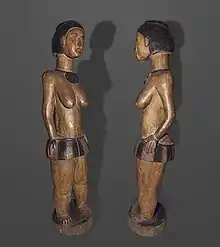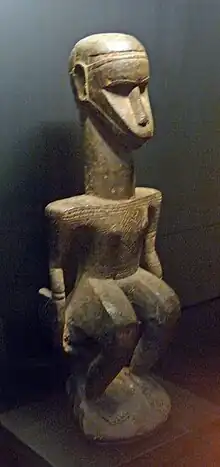Bijago art
Bijago art or Bidyogo art is African tribal art produced by the natives of the Bijagos Islands of Guinea-Bissau.[1] It includes many artifacts for daily use and ritual practices, following a traditional iconography that is unique to their culture, but shows variations from island to island.[2] Such art pieces are known as Bidyogo art and their unique aesthetics make Bidyogo art distinctive from all other African art with the exception of the nearby Baga people who share some of the iconography (and are considered a "related tribe" by Bacquart)."[3]


Shrine pieces
Among the most striking Bidyogo art pieces are the portable ancestor shrines ("iran") that can either be realistic or abstract.[3]
Zoomorphic masks for coming-of-age rituals
Zoomorphic masks representing cows ("vaca-bruta"), sharks, stingrays and, occasionally, other local animals are worn in adult initiation rituals ("fanado") mostly by boys, but occasionally by women.[4]
Other ritual paraphernalia
Traditionally-decorated artifacts are also produced for "fanado" coming-of-age ceremonies (wood masks, spears, shields, headgear, bracelets). Girls are also given stylized dolls to learn about child-caring.[4]
Daily use objects
The Bissagos produce unique objects for daily activities (fishing, agriculture) and personal use (stools, basketry, foodware) and boats.[4]
Architecture
While most Bidyogo hut dwellings show no remarkable artistry, some have their walls painted in bright colors with traditional symbols and patterns. Occasionally, doors are also painted with human or animal figures.[4]
Pieces for the tourist trade
Some of the village artists carve for ritual use as well as for the tourist trade, which can thus enable visitors to acquire ethnographically interesting pieces.[4]
References
- Bidyogo Information Archived 2012-11-19 at the Wayback Machine, Arts&Life in Africa Online, University of Iowa
- Gordts, Andre, La Statuaire traditionelle Bidjogo, Arts d'Afrique Noir, XVIII, summer 1976, pp.6-21
- Bacquart, Jean-Baptiste, The Tribal Arts of Africa, 1998, Thames and Hudson editors. p.21
- Gallois Duquette, Danielle, "Dynamique de l'Art Bidjogo," IICT, Lisbon, 1983
External links
- For spirits and kings: African art from the Paul and Ruth Tishman collection, an exhibition catalog from The Metropolitan Museum of Art Libraries (fully available online as PDF), which contains material on Bijago art